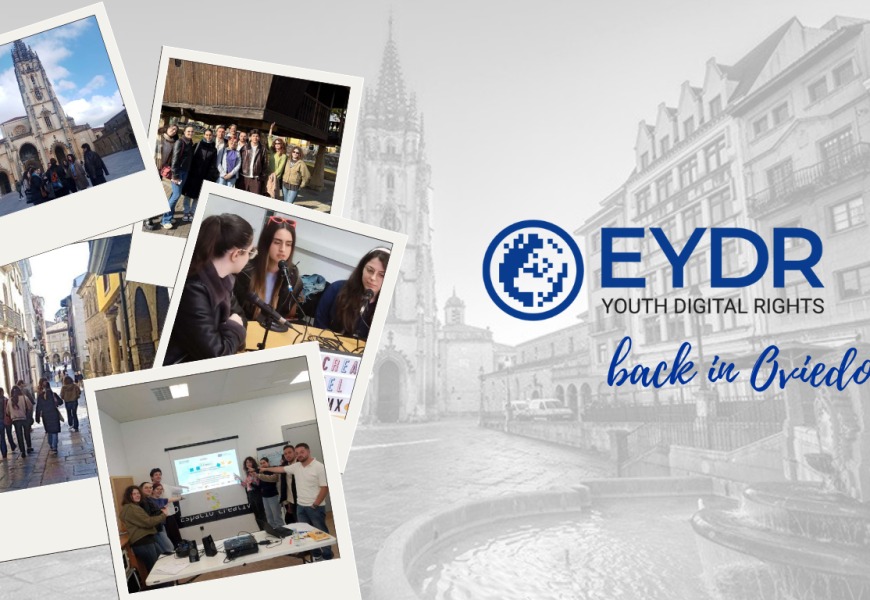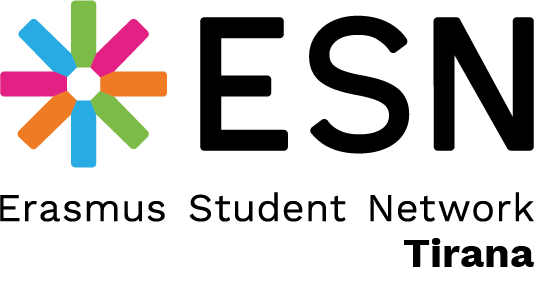Youth Digital Democracy Accelerator Programme: Mobility in Oviedo

Youth Digital Democracy Accelerator Programme: Mobility in Oviedo
From March 25 to 29, 2025, a group of young participants from Albania and Montenegro took part in a mobility experience in Oviedo, Spain, together with local youngsters, as part of the EYDR – Youth Participation in Digital Democracy project. The activity was designed to deepen participants’ understanding of digital rights, enhance their digital awareness, and empower them to actively participate in democratic processes through digital means.
Day 1: Warm up and exploring digital democracy
The programme began with an informal welcoming session led by the host organization, Youropía, where participants introduced themselves and shared expectations for the mobility. This was followed by team-building exercises to foster group cohesion and create an open and collaborative learning environment. At the same time, these first exercises served to stimulate debate around concepts such as digital rights, e-governance and digital critical thinking.
The first day’s thematic focus centered on youth participation and digital democracy. After an introductory session exploring key concepts like participation and youth rights, participants engaged with a presentation by Simone Lucchi, YOUROPÍA’s representative and facilitator, who showcased practical examples of e-democracy in Spain and beyond. This was followed by a peer-led discussion in which participants exchanged good practices from their home countries, including a spotlight presentation by Geart Ferhati on his involvement in the design and implementation of a digital democracy platform.
In the afternoon, the group participated in a cultural activity around Oviedo’s city center, including a visit to the Fine Arts Museum. This not only provided cultural enrichment but also created space for informal networking and exchange among the participants.
Day 2: Digital Media and Activism
The second activity day shifted focus to digital Medias and activism. The morning opened with a simulation exploring challenges such as infoxication, fake news, and hate speech. Participants discussed their own experiences navigating today’s complex digital information landscape. A short theoretical input followed, introducing the concepts of alternative narratives and counter-narratives, particularly in relation to online hate speech. Building on these reflections, the group transitioned into a hands-on session on digital campaigning and online activism. In small teams, participants began designing hypothetical advocacy campaigns, deciding on core messages, target audiences, and communication strategies. In the afternoon, the group travelled to Gijón, where – after a short guided tour of the city – they visited the Youth Council and took part in a presentation and workshop led by local youth workers. There, they explored how to use social media for political advocacy and brought some of their campaign ideas to life using professional technical equipment for podcasts.
Day 3: Emerging technology and ethical challenges
The last day of the programme tackled emerging technologies and ethical challenges, with a particular emphasis on Artificial Intelligence (AI). Inés González Aparicio, development education expert, from CODOPA delivered a thought-provoking presentation on algorithmic justice and the societal implications of AI, followed by a short workshop on alternative narratives. Participants critically discussed how AI systems affect democracy and inclusion, especially for young people.
A particularly meaningful moment came during the final brainstorming session. Each participant identified key issues they considered essential to address through future policy work. They also began to shape their individual and collective roles in the next stages of the EYDR project, whether by contributing to mentored research groups for policy paper development or by co-designing the media campaigns that will support their advocacy. This session not only consolidated the learning achieved during the mobility but also laid the foundation for the project’s future impact — driven by the initiative and vision of the young people themselves.
The final afternoon included a cultural excursion to the historic city of Avilés and the Peñas Cape, fostering further intercultural exchange and informal dialogue among the participants.
Next steps ahead
The youth mobility in Spain is the concluding activity of the Work Package 3: Youth Digital Democracy Accelerator Programme, which aimed to strengthen the capacities of 30 young people from Albania and Montenegro to participate in the digital democracy and protect themselves from cyber threats. Building on the Digital Democracy Workshop Series and their experiences in the mobilities in Belgrade and Oviedo, the youth participants will take a leading role as researchers and online & offline campaign organizers in their local communities. They will write policy briefs, co-design social media awareness raising campaigns together with the partners and will co-host Youth Digital Rights Talks. Stay tuned to learn more of their next steps.
DISCLAIMER:
The Youth Digital Democracy Accelerator Program is part of Youth Participation in Digital Democracy: From Digital Skills to Digital Rights of Youth with Fewer Opportunities (EYDR) project and aims to strengthen the capacities of Albanian and Montenegrin youth to meaningfully engage in digital activism through an approach that balances protection and digital participation.
EYDR is funded by the Erasmus Capacity Building in the Field of Youth of the European Union and is implemented under the leadership of SCiDEV in partnership with UZOR, Beogradski centar za ljudska prava, Asociación Youropia, Centre for Comparative International Studies, Erasmus Student Network in Albania, National Youth Agency in Albania, and SHARE Foundation.
